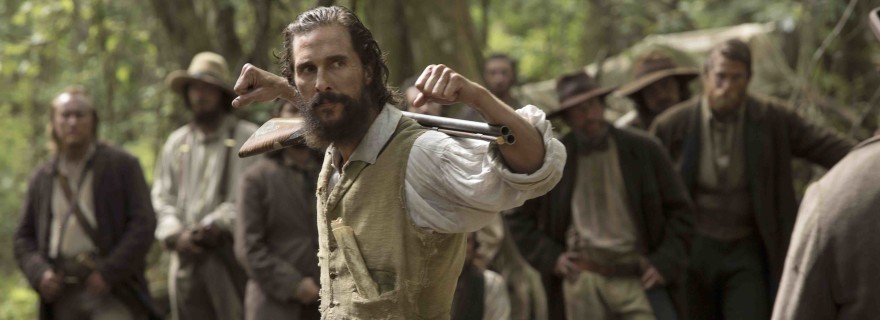'Free State of Jones'
Movie Rating:
2
‘Free State of Jones’ is a well-meaning movie that everyone involved clearly treated with reverence and took very seriously… perhaps a little too seriously. Though filled with some extraordinary moments, director Gary Ross’ determination to cram as many history lessons as humanly possible into his grand Civil War epic often makes it dramatically inert and downright confusing.
It’s like sifting through a series of research notes linked by a bearded Matthew McConaughey rather than watching anything resembling a cohesive narrative. Perhaps there was once a 4- to 5-hour version of this movie that felt complete, but what we’re left with feels like disconnected table scraps that never quite form a meal.
McConaughey stars as Newton Knight, a Mississippi farmer drawn into a Civil War he never believed in, only to desert it when he’s had enough. He goes on the run, eventually finding solace amongst a small group of escaped slaves. He’s given food and tools stolen from a plantation by a young woman named Rachel (Gugu Mbatha-Raw) who’s enslaved to the home. Eventually, Knight finds more deserters and slaves, pulling them together to form a guerrilla army who revolt against the Confederacy and pillage the South for food, supplies and anything else they wish. Together, they form an independent county called (you guessed it) the “Free State of Jones” and fight off anyone who challenges their domain.
After the war, Knight moves away from white society and marries Rachel, helping fight new racist laws that counties created to block the Reconstruction. The real Knight lived into the 20th Century fighting for some semblance of equality, but as we’re told in a recurring wrap narrative set decades in the future, the battle was far from over when the Civil War ended.
In writing, all that sounds fairly concise and even a rather strong subject matter for a film (despite the unfortunate “white savior” presentation of slavery and reconstruction, which is a bit tiresome at this point). The trouble is that Ross’ sprawling effort never quite goes from A to B in a straight line. The episodic narrative feels like chapters pulled from an extended biography about Knight. The movie makes huge leaps back and forth in time seemingly without reason. Characters (such as Keri Russell as Knight’s first wife) pop up and disappear almost at random.
The movie has little real structure or clear driving force, so it seems to spill out one rambling scene after the next. Whenever it feels like some narrative momentum is developing, the movie jumps ahead a few years and starts fresh. Perhaps this was a deliberate style of storytelling chosen by Ross (his work on films like ‘Pleasantville’ and ‘Big’ certainly shows that the guy knows classical story structure) that attempts to unfold with the jagged rhythms of life. Or maybe he just had too much material to include and didn’t worry about structure at all. Most likely, this movie was sheared down from an initial epic running time to the somewhat sloppy and condensed version that viewers are stuck with now. Regardless, ‘Free State of Jones’ is kind of a mess. That’s a shame, because it’s a rather well-made movie on a scene-by-scene basis.
The opening Civil War battle scene is a gut punch introduction of visceral power. The performances (especially from a desperate and noble McConaughey) are all painfully human and moving. The way the film explores guerilla war tactics to fight against unjust oppression from other Americans offers an intriguingly contemporary political undercurrent to consider, as is the unapologetic depiction of the hate and manipulation that continued against African Americans during Reconstruction.
The film is a beautifully mounted production that was clearly lavished with attention and detail. Quite a bit went right and the motivations of Ross and company were noble. As such, it’s incredibly frustrating that the film just doesn’t play well as a whole. All of its craft and ideas feel wasted on a stuttering narrative that’s difficult to get invested in. It feels like Ross bit off more than he could chew with the project, attempting to cram an entire miniseries worth of ideas into a painfully overwrought 2 hour and 19 minute running time that’s difficult to sit through for reasons beyond the disturbing subject matter.
It’s really too bad, because buried within this movie is a timely history lesson worth exploring. Hopefully, someday an extended director’s cut will reveal that satisfying film. In the meantime, the mess that’s opening in theaters this week sure doesn’t feel like the cohesive vision of a talented filmmaker.




William Henley
“It’s like sifting through a series of research notes linked by a bearded Matthew McConaughey rather than watching anything resembling a cohesive narrative. Perhaps there was once a 4- to 5-hour version of this movie that felt complete, but what we’re left with feels like disconnected table scraps that never quite form a meal.”
Sorry to hear this, I was looking forward to this movie. I would have rather have had a 4-5 hour historically accurate miniseries (there are many fantastic miniseries from this time period) than a 2 hour movie that you cannot follow.